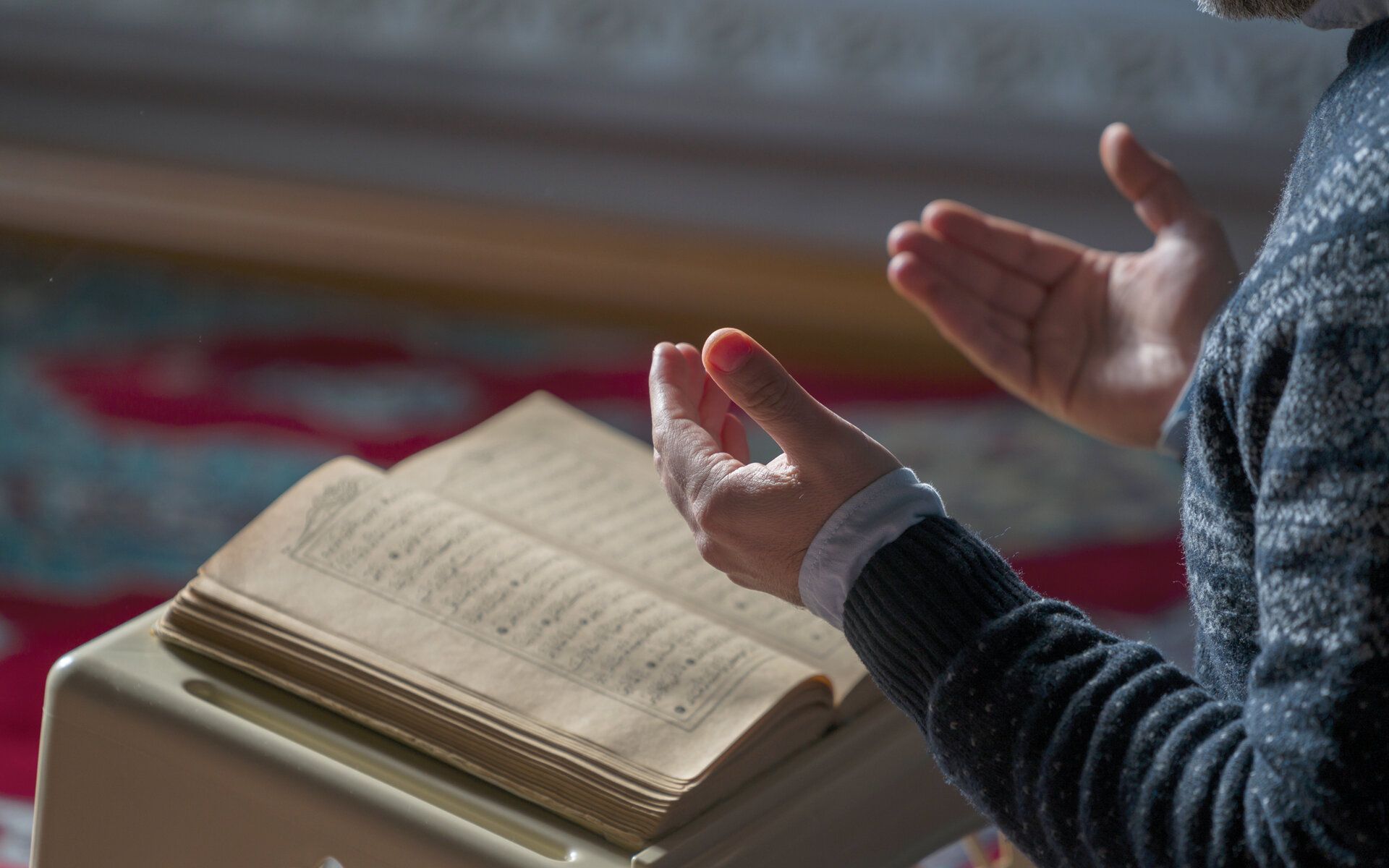Unity - 2

In This Article
-
The Qur’an is clear and precise concerning the matter of unity. It orders that we should admit that God is both the sole Lord of creation, the One Who creates, maintains, protects and provides—and the sole Deity.
-
All the verses mentioning God and His Names, Attributes and Acts are proclamations of His being the sole Deity, while the declarations referring to worshipping the Absolute Object of Worship, Who has no equals, opposites or rivals, and which forbid the worship of anything or being other than Him, are indications of His being the One and Only Lord.
-
Travelers to God who are at the beginning of the journey, a journey of which they are expected to reach the end, advance in the company of proofs, indications, and observations of their inner world and the world around them. These are the strongest groundings of unity.
(continued from the previous issue)
God’s Lordship and the lights of His Existence and Lordship which shine on things and events are stressed in many verses of the Qur’an such as: God, there is no deity but He; the All-Living, the Self-Subsisting (by Whom all subsist.), Slumber seizes Him not, nor sleep. (2:255); Alif-Lam-Mim. God, there is no deity but He; the All-Living, the Self-Subsisting (by Whom all subsist.) (3:1-2); Say (O Messenger): “O God, Master of all dominion! You give dominion to whom You will, and take away dominion from whom You will…” (3:26); (He) the All-Merciful, established Himself on the Throne (20:5); And say: “All praise be to God, Who has neither taken to Him a son, nor has He any partner in His dominion (of the whole creation); nor does He need, out of weakness, anyone to own and protect Him; and exalt Him with all His limitless greatness.” (17:111), and Say: “He is God, the One; God is the Eternally Besought-of-All. He has not begotten, nor been begotten. There is nothing equal to Him.” (112:1–5). A conscience which discerns this majesty of the Divine Lordship, feels deeply and eagerly the necessity to worship Him in the face of this all-encompassing scene or in these concentric scenes of Lordship, and responds with: All praise and gratitude is for God, the Lord of the worlds. The All-Merciful, the All-Compassionate. The Master of the Day of Judgment. You alone do We worship and from You alone do we seek help (1:1–4). It demonstrates its readiness to serve Him in response to the Divine proclamation, O humankind, worship your Lord (2:21); receives from the warning, Worship your Lord until certainty (death) comes to you (15:99), the message that His eternal Lordship requires perpetual servanthood; and understands from the declaration, Worship God, devoted to Him alone in all your religious practices (39:2), that we must fix our eyes on Him exclusively.
The banner of the declaration, “O unbelievers! I do not worship what you worship” (109:1–2) undulates over our head, and determines the nature of our position with all else save Him. We demonstrate the purpose for our creation by proclaiming, You alone do we worship (1:5), and we acknowledge with utter modesty and a feeling of insignificance that We rely on Him alone in order to realize this purpose, declaring, And You alone do we ask for help (1:5). In order to fulfill the task that is required by near- ness to Him and the rank of addressing Him directly which the two declarations above indicate, we reinforce our acknowledgment of His being the sole Deity to be worshipped and applied to for help, with the prayer: Guide us to the Straight Way, the way of those whom You have favored! (1:6–7). Following this, we exhibit our care and sincerity in this petition, continuing: Not (the way) of those who have incurred (Your) wrath (punishment and condemnation), nor of those who are astray (1:7). Thus, traveling at least forty times a day from our acknowledgment of God’s Unity in Lordship to His Unity in Divinity, and thence to His Unity in being the Sole Object of Worship, we try to fulfill what is required by our having been created as the best pattern of creation.
In short, the Qur’an is clear and precise concerning the matter of unity. It orders that we should admit that God is both the sole Lord of creation, the One Who creates, maintains, protects and provides—and the sole Deity. In all its chapters, from the longest (Suratu’l-Baqara, 2) to the shortest (Suratu’l-Ikhlas, 112), the Qur’an declares, teaches and reiterates unity explicitly or implicitly. In Suratu’l-Ikhlas, in addition to emphatically teaching that God is the sole Lord of creation, it is also emphasized that He has Attributes of Perfection and is above having any imperfections. Suratu’l-Kafirun (109) warns us that only God is to be worshipped, and calls on us to turn only to Him in our beliefs, lives, and expectations. A careful study of the Qur’an will show that it turns on the axis of unity. All the verses mentioning God and His Names, Attributes and Acts are proclamations of His being the sole Deity, while the declarations referring to worshipping the Absolute Object of Worship, Who has no equals, opposites or rivals, and which forbid the worship of anything or being other than Him, are indications of His being the One and Only Lord.
From another perspective, believing in God’s being the sole Lord of creation, which is also called “unity with respect to knowledge,” means confirming all the truths pronounced by the master of creation, upon him be peace and blessings. As for believing in God’s being the one and only Deity, which is also known as “unity with respect to practice,” this denotes doing the religious commandments as they should be done, avoiding those things that have been prohibited. Unity with respect to knowledge is perfected by knowing the All-Holy One as One Who has Attributes of Perfection and in believing that He is above all imperfections. Unity with respect to practice can be realized by worshipping and loving the All-Majestic, All-Exalted One, by being sincere toward Him, and by preserving the balance between fear of and expectations from Him.
Travelers to God who are at the beginning of the journey, a journey of which they are expected to reach the end, advance in the company of proofs, indications, and observations of their inner world and the world around them. These are the strongest groundings of unity. At every stage of their journey, travelers feel and sense the signs that come to them according to the rank and capacity of each, and review them. To the extent that they reach deeper perceptions and experiences, they can feel or see in the proofs and indications the One indicated by them. They reach through signs and witnesses to the One Witnessed. Then, in the broad atmosphere of spiritual discoveries, pleasures and feelings, they begin to feel, see and hear the messages brought by the Prophets beyond the normal scope of the senses and feelings. They experience delight in observing the truths that are demonstrated by proofs and indications, but without needing them any longer, for they have passed beyond all concepts of quality and recognition through examples, and beyond the normal scope of perception.
So, this concept of unity—unity which becomes visible as God’s special stamp on things and events by means of the proofs and indications that are observed and experienced in the inner world of people and in the outer world—is an objective concept, and an observatory from which everyone can attain certain knowledge of God. One who admits of it can, if possessed of the necessary capacity, advance as far as being able to perceive the true nature of apparent causes (in nature) and the means of knowing the Almighty. One sees that all those causes and means are lost before their Creator, Who is the real agent beyond them, and one witnesses that all proofs and indications end in an inner perception beyond the scope of the senses. The deeper the state one gets into and the greater the pleasure one feels, the more pro- found and vivid the degree of the concept of unity one can reach. Travelers to God who have reached this point live immersed in the special favors that come as a reward for their inner perception and the insight they have attained by starting from the proofs and indications. Because of the light which the Eternal Witness has placed in them, all their thoughts, speeches and acts become “light.” They walk intoxicated by the manifestations of the “Facial” Lights of Him Who has created the light. When proofs and indications have developed into the voice of their state, they no longer need them, nor do they seek an apparent cause to rely on the Creator of all causes, nor run after other means. Rather, they begin to see, know, and love by Him, and to transform what- ever they see and hear into knowledge and love of God, and into attraction and the feeling of being attracted by Him. They spend their life in the tides of absorption and distinguishing.
At this point, where the initiates feel as if they are seeing the Necessarily Existent Being in everything with their eyes, apparent, external causes fade away and lose the ability to be a means for happiness or salvation, although they continue to exist as mere causes. Whereas the internal causes of belief, confirmation, and the knowledge and love of God are felt more deeply. It is for this reason that, so long as the travelers to the Ultimate Truth advance on the spiritual journey, they feel an increasing passion for worship and other acts of obedience to God. As they grow in the knowledge and love of God, they feel that they are overflowing with prayers and invocations and they become like a nightingale singing ceaselessly in the court of God. They always mention Him with the voice of their heart. In addition, neither their being able to observe from here the worlds beyond, nor crossing distances by flying through the heavens, can harm the self-pos- session that they maintain in their humble servanthood to God.
As for the unity the Necessarily Existent Being has assigned to Himself—a unity based on His bearing witness to Himself—it is an attainment belonging, first, to the Prophets, and then to their true successors. It is not possible for us to perfectly perceive such a horizon of knowing and feeling God. It is an extremely great favor from Him by which He endows the perfectly pure hearts with the necessary capacity to feel that perfect conception of unity, which He expresses in verses such as:
God, there is no deity but He, the All-Living, the Self-Subsisting (by Whom all subsist) (2:255).
God bears witness that surely there is no deity but He (3:18). Surely, I am God, there is no deity but I, so worship Me (20:14). He is God: there is no deity but He (59:22).
It is a great favor of Him to enable those so favored to voice this perfect conception of unity with their hearts, and cause them to understand and express their poverty and helplessness before Him and the fact that whatever they have is from Him, with confessions such as follows:
We have not been able to know You as knowing You requires, O the One Known!
We have not been able to worship You as worshipping You requires, O the One Worshipped!
We have not been able to mention You as mentioning You requires, O the One Mentioned!
We have not been able to thank You as thanking You requires, O the One Thanked!
He makes them express this favor in consideration of the requirement to know Him as He must be known, and with a consciousness of servanthood, and an attitude of helplessness and poverty, and with a yearning for thankfulness and praise. It is not possible for others to perceive this. How can it be possible, seeing that this is a special gift from the All-Bestowing, no matter how it was prompted or if prompted at all? Only those who can bear the weight of His gifts are loaded with them.
Only the Prophets and their true, pure successors can feel this degree of unity in the perfect form, and they can reveal to others only the part of it that they are allowed to reveal. The pure, perfected scholars, who are the true successors of the Prophets, run in the spacious field of this unity and try to breathe it out with certain ambiguous symbols according to their capacity. Saints who follow them whisper it to themselves when they deem it necessary, but none of them reveal the state they are in nor the pleasures they feel. They consider its revelation to be a grave error committed against the honor of Divinity, and tremble with fear at giving away the secrets with which they have been entrusted.
What should be done here, in this respect, is to regard the messages of the Prophets as sufficient, and by admitting that acknowledging one’s incapacity to perceive Him is perception itself, attribute to God the knowledge of truth and the concept of unity that belong to the most distinguished among the elect.
It is essential that while thinking of unity as viewed by the elect, either with respect to creed or as an expression of the spiritual state and pleasures, one should strictly follow the guidance of the master of creation, upon him be peace and blessings. For it is always probable that even the lights brightest in appearance, and the deepest pleasures and any knowledge of God not found within the Prophet’s guidance are no more than carnal pleasures and ostentation.
It would be appropriate to end our article on unity with a verse from Çelebizade Abdulaziz Efendi[i] found in Gulshan-i Niyaz, which resembles the poem of Ibrahim Haqqi of Erzurum concerning the Islamic creed, which begins “My Deity, my Lord! My Prophet is surely God’s Messenger:”
I have a conviction that the Divine Being is one,
and I confirm that He has Attributes.
Knowledge, Power, Life, Hearing, and Seeing,
are concealed in His All-Holy Being.
Though the Attributes eternally exist in the Being,
they are neither the Being Himself nor separate from Him.
Those who attempt to qualify You
are unable to understand Your Attributes.
We have not been able to know You as knowing You requires.
He has no equals nor likes in His Oneness,
and He needs no assistants in His sovereignty.
You are not a substance or a body;
nor are You composed nor shaped.
You are the All-Holy Being from nowhere.
Your Attributes are not of the kind of those of the created;
You have no eyes, nor ears, nor any other organs;
You are One without number; and You have no limits;
You are not composed, or separable or dissolvable.
Neither time nor space, O the All-Exalted,
has any meaning in relation to You.
It is also inconceivable that You have any relation with
eating, drinking, getting dressed, or sleeping.
He is All-Majestic and absolutely pure in His Majesty;
He is absolutely above all desires and lusts.
The verses, “He has not begotten nor been begotten,”
have put an insurmountable barrier
before His having parents and children.
You have undoubtedly no beginning or end.
He is the First without a beginning, and the Last without an end.
He is the Eternal Being Who brought the universe into existence,
and each of His creatures is a ray from His all-comprehensive Grace.
His work is the universe and Adam—humankind.
Existence and non-existence are according to His command.
All creation, including the heavens
with all the celestial bodies, and the earth,
have come into existence by His command, “Be!”
If He had not given existence to the universe,
we could not have known Him or known how to bear witness to Him.
He it is Who creates both good and evil; He it is Who is the origin of all deeds.
He has established what is right and what is wrong.
And it is He Who will reward or punish.
O God! Show us the truth as being true and enable us to follow it, and show us falsehood as being false and enable us to refrain from it. And bestow blessings and peace on our master Muhammad, the means for attaining unity, and on his brothers among the Prophets and Messengers, who had strong self-possession.
[i] Karaçelebizade Abdulaziz Efendi (1591–1658) was one of the Shaykhu’l- Islams (the highest religious authority) in the Ottoman State. His Gulshan-i Niyaz (“Rose-Garden of Invocations”) and Rawdatu’l-Abrar (“The Garden of the Godly”) are famous.








